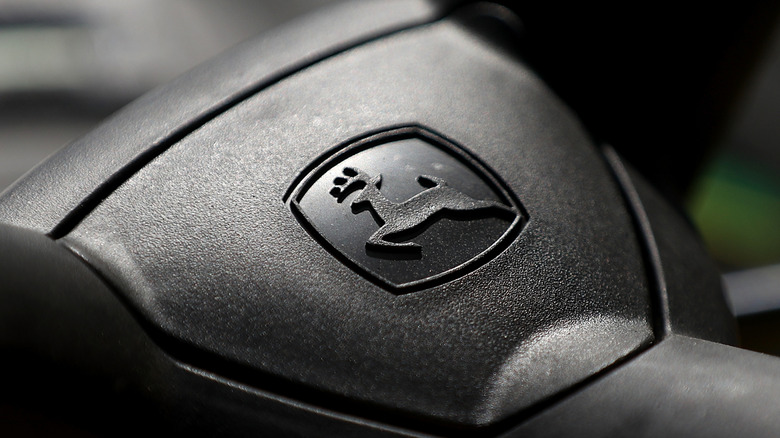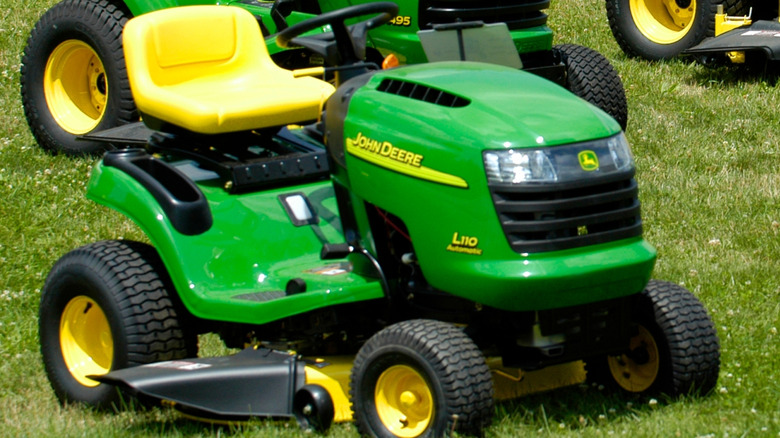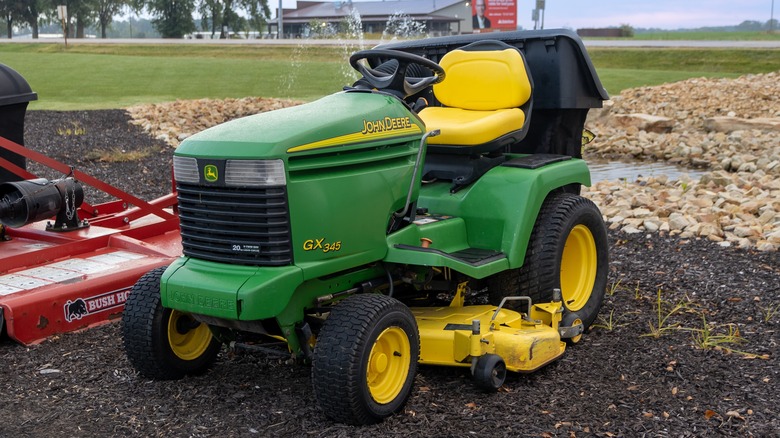Where Are John Deere Tractors And Mowers Made?
John Deere — the company behind the world's most famous tractors – specializes in various outdoor equipment, becoming a powerhouse in the areas of agriculture and landscaping throughout the decades. While many of the brand's offerings, like combines and tillers, are best utilized in large-scale farming environments, others are better suited for smaller-scale, at-home use. Most prominent between both are John Deere's lines of tractors and riding and push mowers, which are user-friendly, durable, and capable of handling a variety of landscaping tasks. Still, reports of their performance might not be enough for those who are in the market.
Going beyond what you can see when you go out to buy a John Deere mower or tractor, some questions about them might arise. First and foremost: where exactly do these John Deere products come from? Since its founding centuries ago in Grand Detour, Illinois, the company has prided itself on being an American entity, with this becoming one of its defining attributes in modern culture. While John Deere and the minds behind it might reiterate this idea, leading many to believe its products — including its tractors and mowers — are American-made, in truth, there's a bit more to the story.
John Deere mowers come from a few different locations in the U.S.
Overall, John Deere's reputation as a highly American business isn't unfounded. Not only is the company's headquarters located in Moline, Illinois, only a short drive away from its historic home of Grand Detour, but roughly 75% of all products sold within the United States are assembled within the country as well. Speaking specifically to its tractors and mowers, there are several U.S. John Deere plants scattered across different states that are responsible for tackling these exact pieces of equipment.
Over in Waterloo, Iowa, one finds John Deere's massive, three-building plant, which was established back in 1918. It consists of a foundry, drive train operations facility, and tractor and cab assembly plant where agricultural tractors are made. Meanwhile, the Augusta, Georgia factory specializes in the design, assembly, and testing of compact utility tractors. As for the Horicon, Wisconsin location, it produces everything from utility vehicles to riding lawnmowers. Further development is set to occur on the existing Greeneville, Tennessee plant in 2025, specifically to meet the demand for zero-turn lawnmowers.
As it turns out, though, all of this isn't enough to keep John Deere's business model running efficiently. In response to increased demand and to support its increasingly varied product catalog, the company hasn't limited its tractor and mower manufacturing solely to the continental United States.
John Deere's tractor and mower operation extends all over the world
Over the years, John Deere has expanded its operation to other parts of the world, with these manufacturing facilities handling pretty full workloads. For example, the Mannheim, Germany location, which opened its doors in 1956, has produced over two million tractors throughout its lifetime. In addition, it has served as a development site to improve the brand's existing models and prepare for the future of agriculture with new ones.
Over in Mexico, the Cutters plant has made John Deere lawn mowers and lawn mower components since its grand opening in 2009. It isn't too far from another, more storied John Deere plant that dates back to 1955, both being located on the same plot of land in Monterrey. On the opposite side of the world, the Tianjin, China, John Deere location has focused on tractors since 2012, having seen its 70,000th tractor roll off the assembly line in 2023. John Deere has expanded into India in recent decades as well, manufacturing tractors in factories located in Pune, Maharashtra and Dewas, Madhya Pradesh.
There aren't many brands that still make their tools in the United States, and while most of John Deere's production and assembly efforts are focused there, evidently, it has expanded to become a global presence. After all, you don't become the foremost name in agriculture and landscaping without extending your reach as far as you can. With John Deere's plans to focus on more electric tractors in the future, it'll be interesting to see where its manufacturing goes next.


